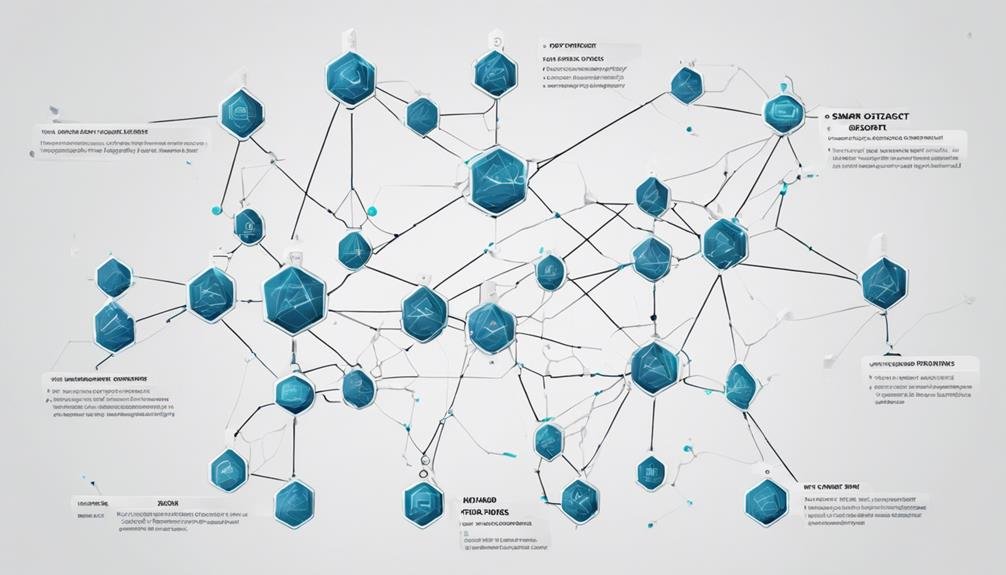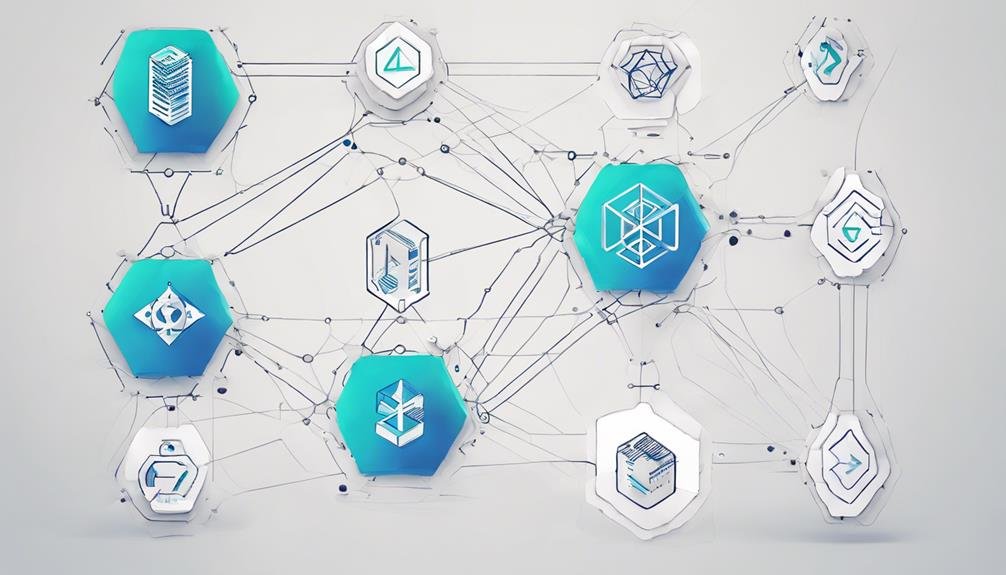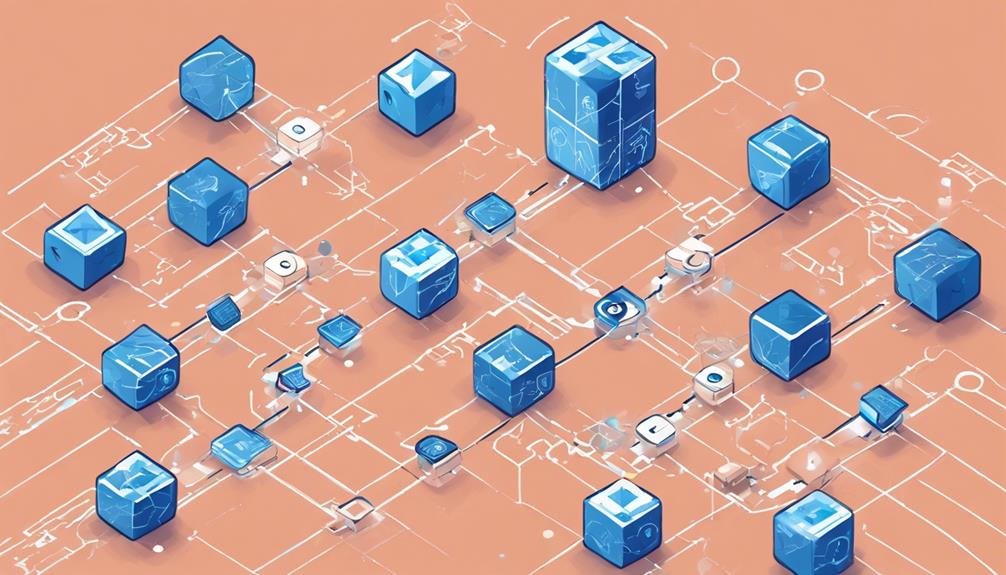To guide contract deployment on blockchain: Initially, select the appropriate platform considering scalability, security, and community support. Next, comprehend smart contract development by studying Solidity and Vyper. Then, create and compile contracts, specifying functions and variables. Verify error-free, gas-efficient code before deploying to the blockchain.
Interact with contracts to trigger state changes and pay gas fees for transactions. Following these structured steps, you can streamline deployment using tools like Hardhat, guaranteeing the successful implementation of smart contracts. Following these steps can further enhance your understanding of the deployment process.
Brief Overview of Smart Contract Deployment Process Step By Step
- Ensure error-free, gas-efficient code for deployment.
- Address security vulnerabilities before deployment.
- Compile bytecode and deploy to the blockchain.
- Utilize tools like Hardhat for streamlined deployment.
- Test functionality on test networks before mainnet deployment.
Choose the Right Blockchain Platform
When selecting a blockchain platform for deploying smart contracts, you should consider various factors such as scalability, security, community support, and interoperability. Scalability is crucial as it determines how well the platform can handle a growing number of transactions without compromising performance. Security is paramount to protect your smart contracts and data from cyber threats. Community support is essential for getting assistance and staying updated on platform developments. Interoperability guarantees that your smart contracts can interact with other networks seamlessly.
Additionally, look into the programming languages supported by the blockchain platform. For example, Ethereum uses Solidity, while other networks may utilize languages like Vyper. Assess the platform’s ecosystem, tooling, and documentation to streamline your development and deployment process. Active developer communities are beneficial for troubleshooting and optimizing smart contract deployment. By researching these aspects, you can choose a blockchain platform that aligns with your project requirements and enhances your smart contract deployment experience.
Understand Smart Contract Development

To grasp smart contract development effectively, familiarize yourself with popular languages like Solidity and Vyper, commonly used on blockchain platforms. Smart contracts, especially on platforms like Ethereum, are essential for handling transactions, storing data, and executing logic autonomously. Once deployed on the blockchain, smart contracts become immutable and transparent. Interacting with smart contracts involves utilizing defined functions and interfaces to access their capabilities. Smart contract development requires writing code tailored to specific use cases and business logic requirements, ensuring the contract behaves as intended.
Solidity and Vyper are key tools in this process, allowing developers to create and deploy smart contracts efficiently. Understanding these languages is critical for implementing smart contracts’ necessary functions and features. By delving into smart contract development, you gain insight into the inner workings of blockchain technology and how transactions are managed securely and autonomously.
Write and Compile Smart Contracts

Commence by writing and compiling smart contracts using languages like Solidity to prepare them for execution on the blockchain. Smart contracts are vital pieces of code that define the rules and conditions of a transaction on the network. When you create a smart contract, you need to specify its functions, state variables, and modifiers to guarantee the desired behavior. Utilizing a compiler, such as the Solidity compiler, you can convert your smart contract code into a bytecode that can be executed on the blockchain. The compilation process produces bytecode and generates the Application Binary Interface (ABI) for interacting with the contract.
Debugging smart contracts is pivotal to ensuring the code is error-free and optimized for gas efficiency, enhancing its performance on the network. Before deployment, addressing any potential issues in the code is crucial to prevent vulnerabilities. Writing and compiling your smart contracts correctly establishes the groundwork for successful deployment and interaction with the blockchain network.
Deploy Smart Contracts to the Blockchain

To successfully deploy smart contracts to the blockchain, ensure the compiled code is error-free and optimized for gas efficiency. When deploying smart contracts on the Ethereum network, it’s essential to confirm your smart contract code is free from vulnerabilities that could be exploited. The contract deployment process involves compiling your smart contract into bytecode, which is then deployed to the blockchain. Using tools like Hardhat, you can efficiently streamline the process of deploying smart contracts.
Once your smart contract is deployed, it becomes an immutable entity on the blockchain, allowing users to interact with it through predefined functions. This interaction with smart contracts is facilitated by sending transactions to the deployed contract, triggering the execution of specific actions based on the contract’s logic. Before deploying the smart contract on the mainnet, it should be tested on networks like Sepolia and Goerli to confirm its functionality and security. By following best practices and being diligent in your deployment process, you can enhance the reliability and effectiveness of your smart contracts.
Interact With Smart Contracts

When engaging with smart contracts, you interact by calling functions to read or modify the contract state. Transactions are the vehicles through which you interact with smart contracts, triggering state changes on the blockchain. Remember, contract interactions come with gas fees to guarantee miners for processing transactions. These fees guarantee the smooth execution of transactions on the blockchain. You can engage with smart contracts through web interfaces, command line tools, or programmatically. Each method offers a different level of control and customization for your interactions.
All interactions with smart contracts are recorded on the blockchain, providing transparent verification for all involved parties. This transparency assures the integrity of the contract interactions and builds trust among users. By understanding how to call functions, manage gas fees, and utilize different interfaces for transaction execution, you can confidently navigate the world of smart contracts.
Frequently Asked Questions
How Do I Deploy a Contract on Blockchain?
To deploy a contract on the blockchain, write smart contracts using Solidity on the Ethereum platform. Compile the code, deploy it using tools like Truffle, pay gas fees for deployment, get a contract address, guarantee security, and handle interactions and upgrades.
How Do You Deploy a Blockchain Project?
To deploy a blockchain project, choose a platform, write smart contract code, deploy using tools, verify, and test for functionality. Interact with the contract through transactions. Guarantee security, monitor gas fees, and consider upgrades.
How Does Blockchain Work for Contracts?
Embrace the power of smart contracts on decentralized platforms like Ethereum. Witness contract execution with digital signatures on an immutable ledger. Engage in trustless interactions, explore contract templates, integrate tokens, and conduct secure code audits.
How Do I Create a Contract in Blockchain?
To create a contract in blockchain, begin by defining its structure, writing code in Solidity, compiling it to bytecode, and deploying it to the network. Test, secure, interact, execute functions, debug, and plan for upgrades.
Conclusion
To sum up, deploying contracts on the blockchain involves selecting the right platform, grasping smart contract development, writing and compiling the contracts, deploying them onto the blockchain, and then interacting with them. Are you prepared to take the next step in utilizing this groundbreaking technology? With the correct knowledge and steps in place, you can confidently and efficiently navigate the world of blockchain. Leap and unleash the potential of smart contracts today!










